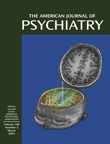Safety of Quetiapine During Pregnancy
To the Editor: Tamás Tényi, M.D., Ph.D., et al. (1) were the first, to our knowledge, to report pregnancy in a woman receiving quetiapine. There is little information as yet concerning the safety of atypical antipsychotic drugs used in pregnancy. We report the case of a woman who was treated with risperidone then quetiapine throughout pregnancy without complications.
Ms. A, a 33-year-old woman, experienced a first episode of psychosis that was initially treated with risperidone, 4 mg/day. After 2 weeks, her medication was switched to quetiapine because of a combination of higher prolactin levels (1997 mU/liter; <550 is the normal maximum) and poor clinical response. Pregnancy was diagnosed during week 4 of the 39-week gestation, after 2 weeks of quetiapine treatment. Conception took place despite hyperprolactinemia.
A collaborative decision was reached to have Ms. A continue taking quetiapine throughout pregnancy because of the level of risk and family history of psychosis. We found no reports of complications during pregnancy or teratogenicity in the medical literature or manufacturer’s database regarding quetiapine. Clinical improvement was monitored by using various clinical rating scales at baseline and at the 6-week, 3-month, and 9-month time points. Ms. A’s scores on the Brief Psychiatric Rating Scale were 21, 0, 4, 0, and 1; her Global Assessment Scale (2) scores were 35, 84, 81, 91, and 89. Her side effects were negligible. Her initial maintenance dose of 300 mg/day was reduced to 200 mg/day at week 21. This dose remained stable until 4 weeks before Ms. A’s estimated due date, when her quetiapine dose was reduced by 50 mg/day each week to enable breast-feeding after birth. Ms. A remained in remission throughout pregnancy and at week 39 gave birth to a healthy girl. The baby weighed 3.61 kg. Her Apgar score in the first minute was 8, and after 5 minutes, it was 9. No problems developed in the first month postpartum. There was no exacerbation of psychosis, and successful breast-feeding was initiated.
This case adds to the small database on the safety of administering atypical antipsychotic drugs at conception and throughout pregnancy. Given the low risk of extrapyramidal and sexual side effects with these drugs, it is likely that they will be used in younger, sexually active patient groups. This report and that of Dr. Tényi et al. on the safety of quetiapine during pregnancy are encouraging. More information is required regarding the long-term effects on children exposed to these drugs in utero. We concur with Dr. Tényi et al. (1) that a cautious clinical approach should be adopted that weighs benefits and risks on a case-by-case basis.
1. Tényi T, Trixler M, Keresztes Z: Quetiapine and pregnancy (letter). Am J Psychiatry 2002; 159:674Link, Google Scholar
2. Endicott J, Spitzer RL, Fleiss JL, Cohen J: The Global Assessment Scale: a procedure for measuring overall severity of psychiatric disturbance. Arch Gen Psychiatry 1976; 33:766-771Crossref, Medline, Google Scholar



